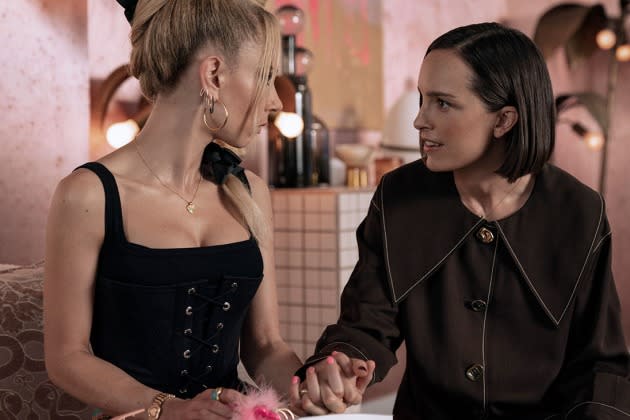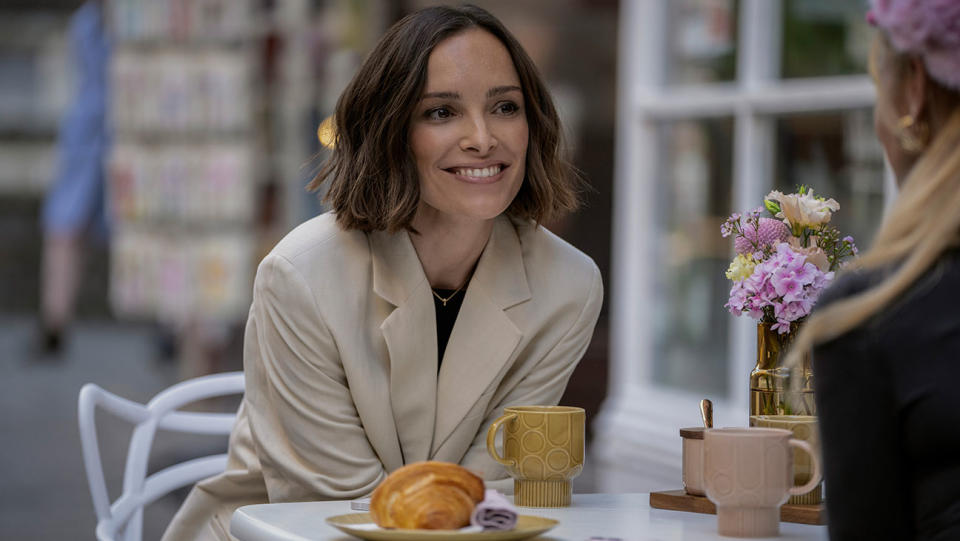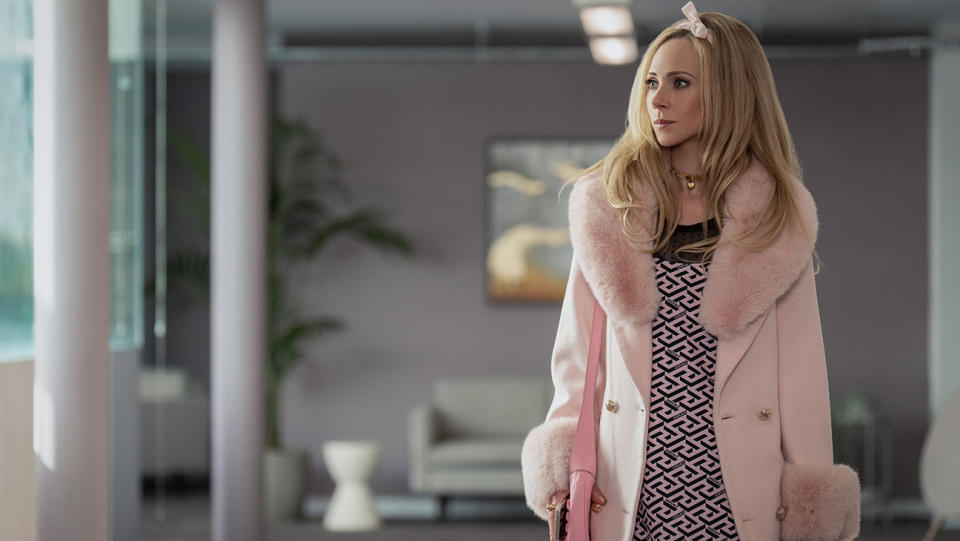‘Ted Lasso’ Star Breaks Down That “Awful and Devastating” Fight
- Oops!Something went wrong.Please try again later.
- Oops!Something went wrong.Please try again later.

[This story contains spoilers for Ted Lasso season three, episode eight: “We’ll Never Have Paris.”]
The eighth episode of Ted Lasso’s third season (and potentially its final season, depending on who you ask) sees several characters stuck inside of sad songs. And while it gets better for most of them, it doesn’t end so happily for everybody.
More from The Hollywood Reporter
In “We’ll Never Have Paris,” written by Keeley Hazell and Dylan Marron, three romantic relationships shift through three very different phases. There’s new love in the form of Nate (Nick Mohammed) and Jade (Edyta Budnik). So new that “love” might even be too strong a word for it, but “boyfriend” is the exact right word as Jade makes her feelings for Nate plainly clear. There’s the potential for some restored love in the form of Ted (Jason Sudeikis) and his ex-wife Michelle (Andrea Anders), who comes to London with her son Henry (Gus Turner) and new boyfriend Dr. Jake (Mike O’Gorman), and then heads directly to Paris with Jake. When she returns from “the city of alright,” she’s not only not engaged to Jake as Ted feared, but seems fairly distant from her new partner. Is reconciliation between Ted and Michelle on the board as the season heads into its final stretch? To be determined.
It’s harder to see reconciliation between the episode’s third central couple: Keeley Jones (Juno Temple) and her new romantic partner Jack Danvers, played by For All Mankind star Jodi Balfour. As Jack, Balfour brings an elite venture capitalist to life, who in turn brings Keeley’s business KJPR to life by funding the company. After overcoming the “love-bombing” phase of their relationship, Jack and Keeley run into a potentially insurmountable obstacle in episode eight, after a massive hack results in several celebrities’ intimate photos, videos and data leaking online, with targets including Keeley.
Jack promises to fix the situation, but the fix comes in the form of a lawyered-up PR statement in which Keeley is asked to express regret over the video leak. Jack is initially amenable to Keeley’s refusal to release the statement, but as the episode wears on, Jack sports a different opinion: “It’s not a great look when the person I’m seeing whose company I fund has a porno online.” When Keeley holds her ground, Jack sets off to leave. Their final exchange, at least for now:
Keeley: “Are you coming back?”
Jack: “I don’t know.”
Is that a wrap on Jack? For Jodi Balfour’s part, she’s keeping it close to the vest, not wanting to answer a question she hopes the audience is asking right now. Even if she doesn’t have “high hopes” for an imminent return, Balfour tells The Hollywood Reporter there’s still unfinished business between Jack and Keeley.
“I would love to see an attempt at resolution,” she says. “There’s a version of these two people who have a lot to learn from each other.”
Below, The Hollywood Reporter speaks with Balfour to break down Jack’s role in the season, tapping into a character vastly different from her own beliefs, what she hopes the future holds for Jack and Keeley, and how her role in a very different space on Apple TV+ impacted her time on Ted Lasso.

Were you a Ted Lasso viewer before you joined the cast?
I definitely watched it a little later than everybody, but certainly still in the pandemic, when it was this warm, cozy blanket we all desperately needed. Similar to a lot of folks, it was the perfect escape. There’s so much kindness and warmth to consume, in a pretty dark time. I watched all of the first two seasons with absolute delight and adoration, and then this audition came my way. It was a thrill. My enjoyment of the show aside, it’s not lost on any actor, the excitement to join something that is so beloved. What goes along with that is a lot of room for creativity, which Jason has. It’s such a fun sandpit to play in.
How did your familiarity with the show impact your audition? Do you take the tone with you into your initial attempts at the character?
When I first got the sides, the role was still a work in progress in the writers’ minds. I was cast, and then there was a fair bit of time before we started shooting. If I’m not wrong, once they knew I was going to be Jack, there was a lot of melding of the character with my essence. I won’t say that on the page I was like, “Oh! I know exactly what this is!” But there was a lot of room for interpretation, which was awesome.
Did you feel there was a lot of collaboration in creating Jack?
From the first time Jason and I got on the phone about the role, everything’s kept so close to the vest, because the show is so hyper-successful. There wasn’t a lot to read for her arc before I started, so we had a lot of conversations about what it looked like. Even before stepping foot on set, there was a large amount of discourse and ideas shared back and forth, and him sharing articles about “love-bombing” with me, and us discussing exactly what that was, and unpacking it so we don’t just villainize this person, so that we understand the motivations behind something like that. On the day, I’ve never done a comedy like this before, and I don’t know if it’s just par for the course in comedy generally, but I’ve never worked in such a fluid way before. New lines are being given to you as alts, and things are evolving and changing in real time. It was a thrill, honestly. It was a very exciting way to work.
Was your process for approaching Jack different as a result, working within the bounds of a comedy?
I worked with a coach, who helped me differentiate my preparation style for a drama with my preparation style for a comedy. It kept things lighter. It seems so obvious, but the way I work is I build character without using a lot of my own life, but using a lot of imagination work. Instead of really building these memories of a character in a life, you get to dance over that a little bit more, and hold it less tightly.
Is there a specific in-road for your understanding of Jack?
She’s a venture capitalist, which I could not be further from in my own life. But I have some friends who are parallel to that world and other friends with small businesses who have had to raise capital before. Even looking at it through the lens of being a producer, if you look at it through our industry. It feels very much like that, making something out of nothing, funding something, helping something grow. I can definitely get excited about that idea of identifying something or someone you believe in, and helping them reach their full potential. That’s such an exciting idea to me.
Otherwise, I’m playing in my own voice, which is not something I’ve done since leaving South Africa. Making sense of that [was a process]. She’s a South African living in London. What does that sound like? How much of my own life, how much of my own sensibility, is applicable? It got progressively harder as the season goes on, because I don’t feel the way Jack feels by the end of her storyline. But that’s the fun part. I don’t want to just play myself the whole time.

This episode in particular must have been challenging, embodying Jack’s response to Keeley getting hacked.
We had a lot of chats about that, particular in our current climate, and how far we’ve come to better understand and better metabolize this kind of thing as a culture. It felt very limited and defined by the patriarchy, and really hard. But the interesting thing about playing someone who thinks differently than you do is that you have to climb inside of it and humanize it. I have to believe that if Jack was being her highest and purest self, this may not have been how she reacts. But there’s so much informing her response that actually has nothing to do with her beliefs, but more the way she’s been conditioned. The reality is, there are many women walking around who are still completely gripped by the patriarchy. We’ve seen enough of that in this country in the last handful of years.
Do you view Jack’s background, coming from a world of enormous wealth, as a boundary for her ability to connect?
It’s almost like there’s a code of conduct. The easiest analogy is it’s almost like royalty. There are very firm boundaries around those folks. I’ll also say, it allows her a certain privilege. The scene where she goes out and announces their relationship to the whole office… thank goodness, and this was a collaborative moment on the day as well, she turns to Keeley and says, “Are you okay if everyone in the office knows we’re dating?” Because otherwise, yikes. She walks into that office and makes a claim to that space without seemingly much cost to her. I think that’s a direct privileged result of growing up the way she grew up, and existing in space the way she does, because she’s wealthy.
Speaking of “existing in space,” you play another very powerful figure in the Apple TV+ universe as President Ellen Wilson on For All Mankind. What did you bring over from there?
There are certain things I could borrow. I, Jodi, do not walk through the world as a shoulders-back person, exuding power and confidence. I just don’t. I’m working on it! (Laughs.) But my work on Ellen, particularly for season three when she became president, was so much more physical and vocal than psychological or imagination-based. That was so paramount to me being believable as that person. Jack has that as well. Just the way she carries her body. That’s the main thing I took. It’s so peculiar to me that I keep getting cast as these high-status characters. If only people knew the truth! (Laughs.) I would love to play against that moving forward. I am dying to play [a different character type].
Can you talk through your collaboration with Juno Temple, especially in this episode? Hopefully it was more enjoyable and collaborative than how we left them at the end of the episode…
Although, you know, it’s funny. That last scene between us, which is awful and devastating, was actually the highlight. It’s a series of scenes, that we shot in almost real-time, even though it doesn’t play that way. The moment Jack arrives and Keeley is playing at the table. The evening the leak happened. There’s just so much to mine there as an actor. There’s love, there’s hope, and I believe a real connection between them. Then all of Jack’s “Jackness” and Keeley’s “Keeleyness,” and their fundamental wiring of where they come from and who they are and who raised them, all of the things that make us who we are — they just can’t make it work. Because of this outside force, too. There’s so much there to play with. On the acting side, we both really loved that day. Juno is a dream. She’s an actor’s actor. It’s all about the work, playing with and for each other. She’s just the best.
Keeley asks Jack if she’s coming back. Jack says she’s not sure. Is she coming back?
I’m not sure… (Laughs.) God, I want the audience to wonder what you’re wondering. I don’t have high hopes, though. But you know, are we still debating the future of Ted Lasso? It remains to be seen.
Interview edited for length and clarity.
Ted Lasso‘s third season is now streaming on Apple TV+. Follow along with THR‘s coverage and interviews.
Best of The Hollywood Reporter

